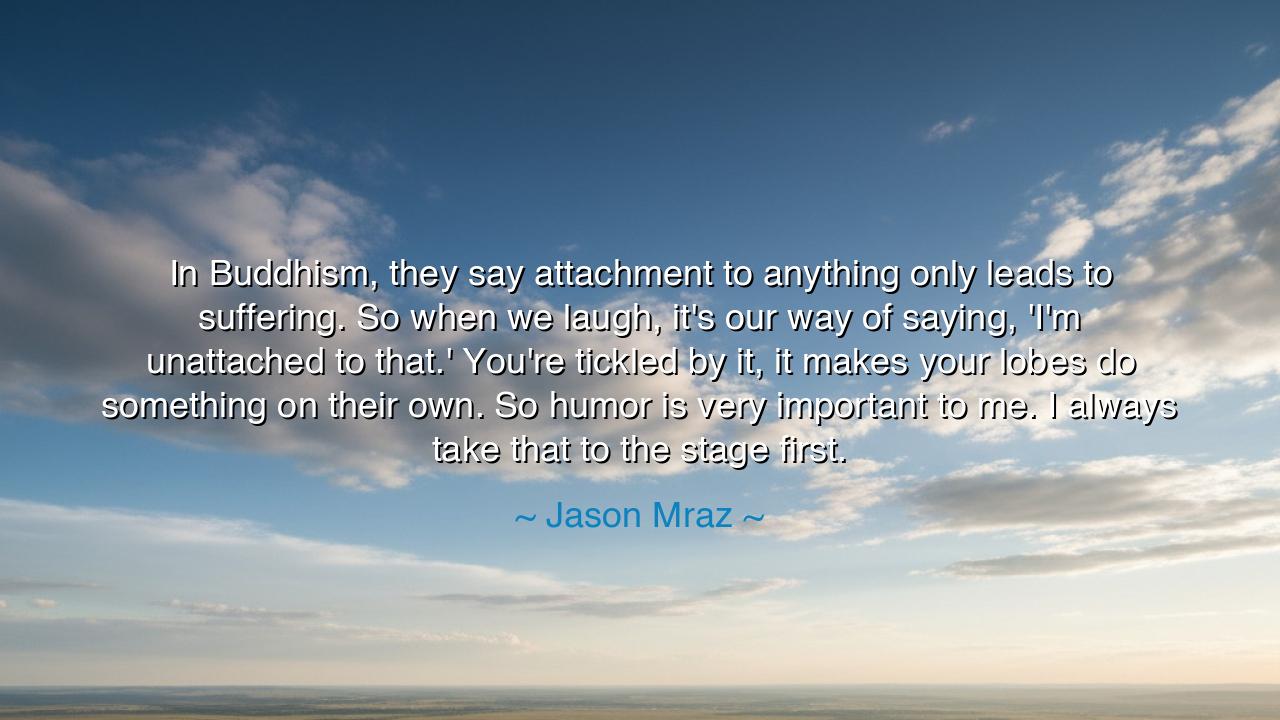
In Buddhism, they say attachment to anything only leads to
In Buddhism, they say attachment to anything only leads to suffering. So when we laugh, it's our way of saying, 'I'm unattached to that.' You're tickled by it, it makes your lobes do something on their own. So humor is very important to me. I always take that to the stage first.






Hear the gentle wisdom of Jason Mraz, a minstrel of peace and laughter, who said: “In Buddhism, they say attachment to anything only leads to suffering. So when we laugh, it’s our way of saying, ‘I’m unattached to that.’ You’re tickled by it, it makes your lobes do something on their own. So humor is very important to me. I always take that to the stage first.” These are words not of jest, but of illumination—for they reveal that laughter is not merely sound, but spirit; not merely reaction, but freedom.
The ancients taught that the root of all sorrow lies in attachment—the clinging of the heart to things that change, decay, and fade. The Buddha, sitting beneath the Bodhi tree, saw the endless wheel of craving: men chasing pleasure, fame, and love, only to suffer when these slipped from their grasp. Yet Mraz, like a poet who dances with wisdom, transforms this teaching into song. He reminds us that laughter is the soul’s rebellion against bondage. When we laugh, we loosen the grip of fear; we declare, “This moment cannot hold me. I am free.” Thus, in his eyes, humor becomes a spiritual practice—a small enlightenment that arrives not in silence, but in joy.
Consider how laughter often bursts forth unbidden, a spontaneous light that cuts through tension or grief. It is a divine interruption, an unpremeditated act of surrender. For in that instant, we cease to control; we cease to cling. The self dissolves, if only for a heartbeat. The laugh is a kind of awakening, a mirror of what the sages called detachment—not the cold indifference of apathy, but the warm serenity of acceptance. The one who can laugh has already begun to let go.
History, too, bears witness to the power of laughter as liberation. It is told that Buddha, once mocked by a skeptic who doubted his calm, merely smiled. His laughter was not scorn, but compassion—the understanding that anger binds the soul, while humor releases it. Centuries later, Zen masters would follow in that tradition, answering profound questions with laughter or paradox, shaking disciples loose from the prison of logic. Even in the silence of monasteries, one could hear the echo of soft amusement, for the enlightened know that truth, once seen, is both wondrous and absurd.
When Mraz speaks of bringing humor to the stage first, he honors this same ancient path. He stands before the crowd not as one who seeks to impress, but as one who seeks to connect—to free both himself and his listeners from the weight of expectation. His songs carry the lightness of detachment, yet also the depth of love. For true humor, born of clarity, does not mock the world; it embraces it. It looks upon the chaos of existence and says, “Yes, this too is part of the dance.”
And yet, there is power in this lightness. The man who can laugh amid turmoil is the man who cannot be broken. The artist who greets failure with humor is the one who remains unconquered. Attachment breeds fear—the fear of loss, the fear of imperfection—but laughter burns it away. It teaches us to meet life as a river meets stones: with movement, not resistance. The one who laughs is the one who flows, and in flowing, finds peace.
So, my listener, let this teaching take root in your heart. Practice humor not as escape, but as awareness. When hardship strikes, let your first breath be deep and your second be light. When you stumble, smile at your folly and rise again. Laugh not to forget, but to remember—that life itself is brief, and therefore sacred. Cultivate a heart that finds joy in impermanence, for only the unbound can truly love what passes away.
For in laughter lies wisdom, and in wisdom, liberation. As Jason Mraz reminds us, every smile, every song, every shared moment of joy is a declaration of spiritual freedom. The world will press its sorrows upon you, but if you can laugh—truly laugh—you have already won. Let your humor be your prayer, your song of detachment, your offering to the fleeting beauty of life. And when you stand before the world, take laughter to the stage first—for it is not only the sound of joy, but the sound of a soul at peace.






AAdministratorAdministrator
Welcome, honored guests. Please leave a comment, we will respond soon